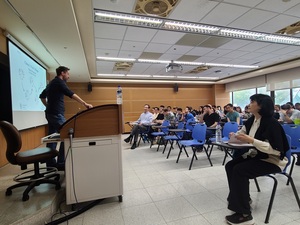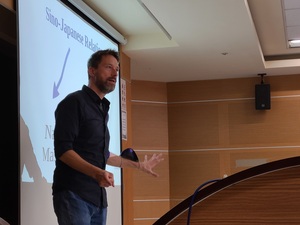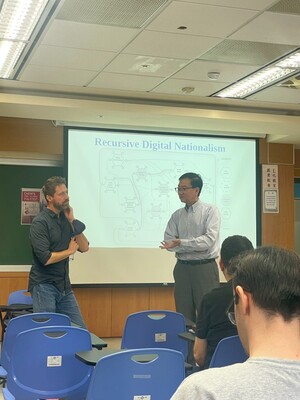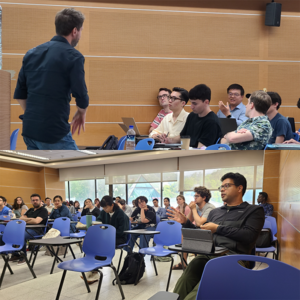IDAS Series -- China’s Viral Villages: Digital Nationalism in Times of Crisis




Date :
2025-04-14
Department :
International Doctoral Program in Asia-Pacific Studies
【Article by IDAS】
National Chengchi University’s (NCCU) International Doctoral Program on Asia-Pacific Studies (IDAS) hosted a lecture by Dr. Florian Schneider, Chair Professor of Modern China at the Leiden Institute for Area Studies, Leiden University. His talk, entitled “China’s Viral Villages: Digital Nationalism in Times of Crisis,” given on April 8, 2025, disentangled crisis moments to shine a spotlight on how divided political opinions are across China, often along fault lines created by tribalist and nationalist attitudes.
Schneider grounded this lecture by laying out how Nationalism gets filtered, transformed, and accelerated through digital networks. In the context of China, Schneider emphasized that the society is not monolithic, nor is the only actor the state, and argued that attitudes are shaped by many actors with their own agency, but that they use the same approved symbols of nationalism. The various types of nationalism interact in complicated ways, and, accordingly, the system can be understood as a complicated network where the government is a node in the process of information exchange, or a hierarchical system where the government oversees information platforms. As such processes unfold, Schneider provided examples of nationalist tactics in the digital environment and their application, but questioned the variation of experiences based on the platform environment.
To understand the political complexities of nationalism in the 21st century, he asked: What happens to nationalism when it goes digital? How do platform societies work? To unpack this, Schneider introduced the concept of “viral villages”—distinct digital communities formed through recursive loops of shared sentiment and interaction. These villages are homogenized spaces that reinforce dominant narratives, often nationalistic in nature. Schneider analyzed Chinese nationalism through a network of platform mechanics and party-state influence. Overall, Schneider argued that digital media platforms are powerful tools for community construction, where states are powerful nodes in signaling the propriety and spread of nationalistic messaging. These “viral villages” illustrate how national solidarity and digital platforms can coalesce during times of crisis.
In the open forum, the first set of probing questions from the students focused on the state’s interjection in nationalism and its effect on the construction of the “viral village.” Treating the state as an actor, Schneider discussed the complicated nature of the analysis in treating the state in China as the party, government, and the State all at the same time. This creates an overlap in the model, where nationalism has a narrow, parochial definition. The subsequent discussion touched on ethnic nationalism, censorship, and the effect of Chinese nationalism on international relations. Returning again to the concept of collapsing the party and the state, he expanded on understanding how the state as a node works within the local system, injecting these networks with their own values—a type of nationalism branded as patriotism, which is state-led.
In conclusion, the lecture explored the crucial role of technology in political discourse and what it can tell us about the way in which different actors construct and manage nationalism in contemporary Chinese society and politics. Schneider provided students with insights into how popular nationalism is evolving today and how it might be connected to domestic and foreign policy in the PRC.
National Chengchi University’s (NCCU) International Doctoral Program on Asia-Pacific Studies (IDAS) hosted a lecture by Dr. Florian Schneider, Chair Professor of Modern China at the Leiden Institute for Area Studies, Leiden University. His talk, entitled “China’s Viral Villages: Digital Nationalism in Times of Crisis,” given on April 8, 2025, disentangled crisis moments to shine a spotlight on how divided political opinions are across China, often along fault lines created by tribalist and nationalist attitudes.
Schneider grounded this lecture by laying out how Nationalism gets filtered, transformed, and accelerated through digital networks. In the context of China, Schneider emphasized that the society is not monolithic, nor is the only actor the state, and argued that attitudes are shaped by many actors with their own agency, but that they use the same approved symbols of nationalism. The various types of nationalism interact in complicated ways, and, accordingly, the system can be understood as a complicated network where the government is a node in the process of information exchange, or a hierarchical system where the government oversees information platforms. As such processes unfold, Schneider provided examples of nationalist tactics in the digital environment and their application, but questioned the variation of experiences based on the platform environment.
To understand the political complexities of nationalism in the 21st century, he asked: What happens to nationalism when it goes digital? How do platform societies work? To unpack this, Schneider introduced the concept of “viral villages”—distinct digital communities formed through recursive loops of shared sentiment and interaction. These villages are homogenized spaces that reinforce dominant narratives, often nationalistic in nature. Schneider analyzed Chinese nationalism through a network of platform mechanics and party-state influence. Overall, Schneider argued that digital media platforms are powerful tools for community construction, where states are powerful nodes in signaling the propriety and spread of nationalistic messaging. These “viral villages” illustrate how national solidarity and digital platforms can coalesce during times of crisis.
In the open forum, the first set of probing questions from the students focused on the state’s interjection in nationalism and its effect on the construction of the “viral village.” Treating the state as an actor, Schneider discussed the complicated nature of the analysis in treating the state in China as the party, government, and the State all at the same time. This creates an overlap in the model, where nationalism has a narrow, parochial definition. The subsequent discussion touched on ethnic nationalism, censorship, and the effect of Chinese nationalism on international relations. Returning again to the concept of collapsing the party and the state, he expanded on understanding how the state as a node works within the local system, injecting these networks with their own values—a type of nationalism branded as patriotism, which is state-led.
In conclusion, the lecture explored the crucial role of technology in political discourse and what it can tell us about the way in which different actors construct and manage nationalism in contemporary Chinese society and politics. Schneider provided students with insights into how popular nationalism is evolving today and how it might be connected to domestic and foreign policy in the PRC.


 Fax:886-2-29379611
Fax:886-2-29379611